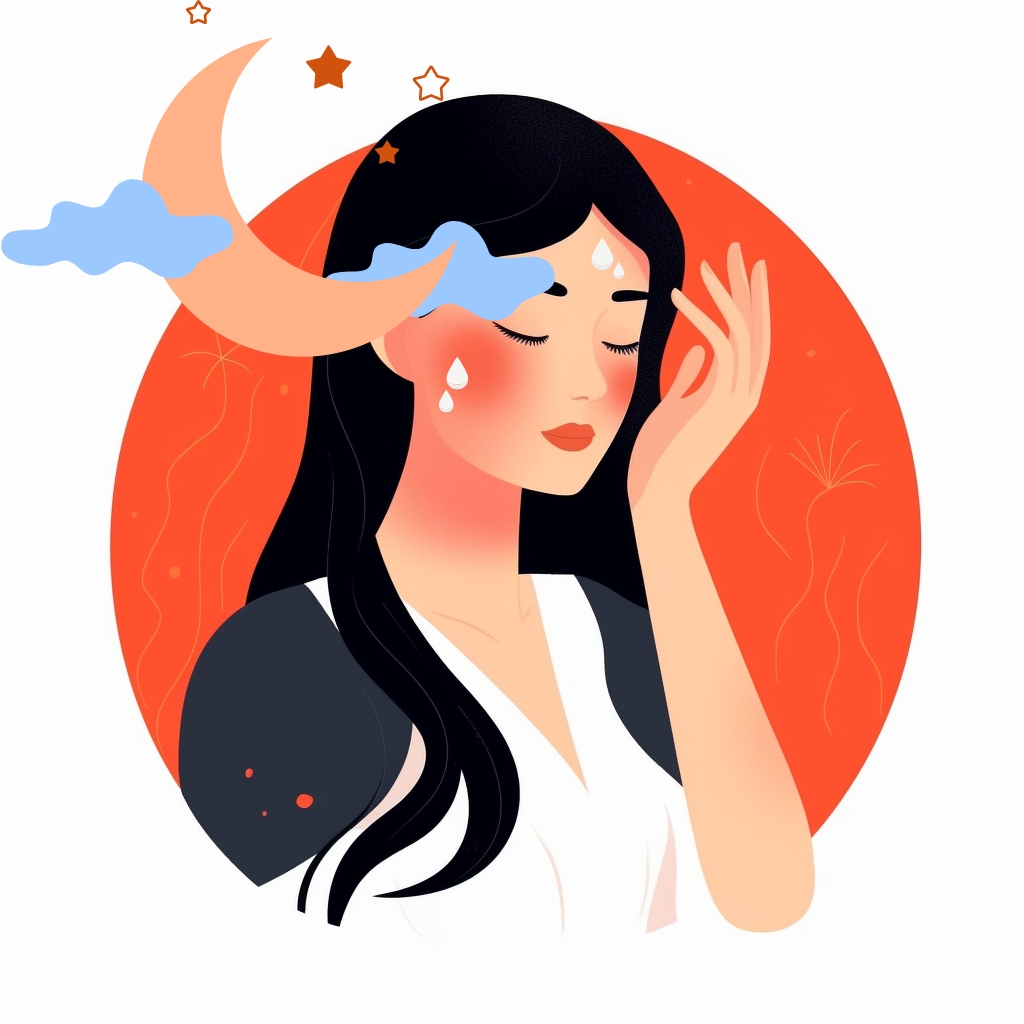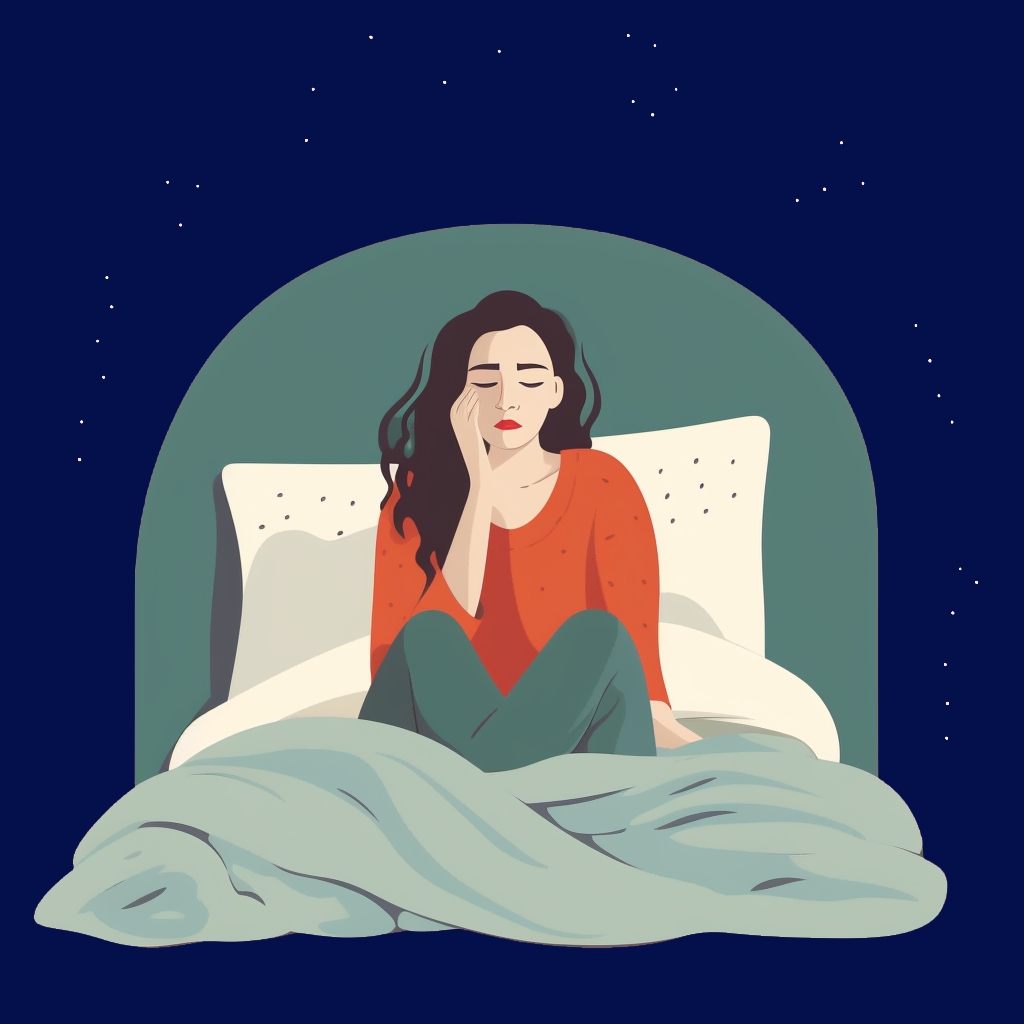PMS Night Sweats: The Connection Between Night Sweats and PMS

Night sweats during PMS are a common occurrence among women that can significantly impact their overall health and well-being. While many women may experience this symptom during their menstrual cycle, it is often overlooked and dismissed as a normal part of the premenstrual experience. However, it’s important to understand the causes and significance of night sweats to identify and address underlying health issues associated with them.
Despite the discomfort and disruption caused by PMS night sweats before or during the period, many women may not realize that this symptom can also be a red flag for underlying health issues. Therefore, understanding the causes and significance of night sweats is essential in identifying and addressing any possible underlying medical conditions. By paying attention to the signs our bodies give us, we can take proactive steps to maintain our health and well-being.
What Do Pre-Period Night Sweats Tell You?
Night sweats during PMS are often the result of hormonal changes that occur during the menstrual cycle. Specifically, the fluctuation of estrogen and progesterone levels can impact the body’s temperature regulation, leading to increased sweating and discomfort. Estrogen is known to have an impact on the hypothalamus, the part of the brain responsible for regulating body temperature, while progesterone may have an impact on the nervous system, leading to changes in body temperature and sweating patterns.

It’s also worth noting that PMS night sweats during the period can be indicative of the transition to perimenopause or menopause. Perimenopause is the time leading up to menopause when hormone production begins to decline, and the body undergoes significant changes. As a result, women in perimenopause may experience night sweats and other menopausal symptoms. Menopause, which is defined as the cessation of menstruation for 12 consecutive months, can also cause night sweats as a result of changes in hormone levels.
Uncommon PMS Symptoms!
Wondering why these rare and weird symptoms happen to you?
Read the article below and find out:
How Frequent are Night Sweats During the Period?

Night sweats are a common symptom among women during their menstrual cycle, with many women experiencing this symptom to varying degrees. In fact, night sweats are reported in up to 50% of women during PMS.
How common are premenstrual night sweats?
According to a study conducted by the American College of Obstetricians and Gynecologists, approximately 85% of women experience at least one PMS symptom during their reproductive years, and night sweats are among the most common. Additionally, the study found that women who experienced more severe PMS symptoms were more likely to report night sweats.
While PMS night sweats before the period are common, they can still be disruptive to a woman’s sleep and overall quality of life. It’s important to recognize the frequency and severity of this symptom to determine if there may be an underlying health issue causing it. If you are experiencing severe or persistent night sweats during PMS, it’s recommended that you speak with your healthcare provider to rule out any potential medical conditions.
| Related: Worst PMS Symptoms
Red Flags of Night Sweats

While night sweats are often associated with PMS and menopause, they can also be a sign of an underlying health issue. Night sweats may sometimes indicate a more serious medical condition, making it important to recognize them as a red flag.
There are several health issues that may cause night sweats, including infections, hormonal imbalances, certain medications, and even some types of cancer. Night sweats may also be a symptom of sleep apnea, a condition in which a person experiences repeated interruptions in their breathing during sleep.
It’s important to recognize any changes in your night sweats patterns, particularly if they become more severe or frequent over time. If you’re experiencing night sweats that are accompanied by other symptoms such as fever, unexplained weight loss, or cough, it’s recommended that you speak with your healthcare provider. They can help determine the underlying cause and provide appropriate treatment if necessary.
| Important: PMS vs. Pregnancy Symptoms
Other Possible Causes of Night Sweats
While night sweats and PMS before the period are a common symptom of the menstrual cycle, it’s important to recognize that they can also be caused by other factors, a variety of medical and non-medical reasons.

The top 10 causes of night sweats
- Hormonal changes, such as those seen in menopause or perimenopause
- Medications, such as antidepressants or steroids
- Injections, such as tuberculosis or HIV
- Sleep apnea
- Anxiety or stress
- Neurological conditions, such as autonomic neuropathy or Parkinson’s disease
- Cancer, such as lymphoma or leukemia
- Hypoglycemia, or low blood sugar
- Hyperthyroidism, or an overactive thyroid gland
- Gastroesophageal reflux disease (GERD)
Identifying the cause of night sweats is important in determining appropriate treatment options. For some causes, such as hormonal changes or stress, lifestyle modifications may be recommended. Other causes, such as infections or cancer, require medical intervention. Speaking with your healthcare provider can help identify the underlying cause of your night sweats and guide appropriate treatment options.
| Discover: Good Foods for PMS Cramps, Mood Swings, etc.
Differences Between PMS and PMDD Night Sweats
Understanding the nuances of PMS night sweats and PMDD night sweats can make a substantial difference in symptom management and overall well-being.
Frequency and Severity:
- PMS night sweats tend to be less frequent and milder in intensity. They may come and go throughout the premenstrual phase.
- In contrast, night sweats in PMDD can be more severe and persistent. They may last for a longer duration, causing significant discomfort.
Triggers and Onset:
- Premenstrual night sweats are often triggered by hormonal fluctuations and begin a few days before menstruation.
- PMDD night sweats, on the other hand, are typically triggered by extreme hormonal changes and usually start about one to two weeks before menstruation.
Emotional and Physical Symptoms:
- PMS and night sweats are often accompanied by a range of physical and emotional symptoms, including bloating, breast tenderness, mood swings, and irritability.
- In PMDD night sweats, they may be accompanied by more severe emotional symptoms, such as severe depression, anxiety, and extreme irritability, making the overall experience more challenging.
Treatment Approaches:
- Managing night sweats in PMS often involves lifestyle adjustments, such as staying cool at night, managing stress, and dietary changes.
- In PMDD night sweats, a comprehensive approach that may include medication, hormonal therapy, and psychotherapy is often necessary to address night sweats and the broader range of symptoms.
The Impact of Premenstrual Night Sweats on Health
While night sweats during PMS can be uncomfortable and disruptive to sleep, they can also have a negative impact on overall health. Chronic lack of sleep can increase the risk of developing health issues such as obesity, diabetes, and heart disease. Additionally, underlying medical conditions causing night sweats can also have significant health implications.

Treating underlying medical conditions causing night sweats, such as hormonal imbalances or infections, can improve overall health and reduce the frequency and severity of night sweats during PMS. Seeking medical attention and following recommended treatment plans can help improve sleep quality and overall health.
Tips for Managing Night Sweats during PMS
- Wearing breathable clothing to bed
- Keeping your bedroom cool and well-ventilated
- Drinking plenty of water to stay hydrated
- Avoiding spicy and heavy meals before bed
- Practicing relaxation techniques such as meditation or deep breathing exercises
- Using cooling products such as fans, cooling pillows, or sheets
Improving sleep quality and overall health can also involve establishing a regular sleep routine, avoiding stimulating activities before bed, and limiting exposure to electronic devices in the bedroom. By making these lifestyle modifications and seeking medical attention when necessary, women can effectively manage PMS night sweats during period and improve their overall health and well-being.
| Suggestion: What is the Best Vitamin to Take for PMS?
HealWiser’s Last Piece of Advice
PMS night sweats are caused by hormonal changes during the menstrual cycle, and are a relatively common symptom experienced by many women. While often not a cause for concern, night sweats can sometimes indicate underlying medical conditions.
By recognizing the potential implications of night sweats, seeking medical attention when necessary, and making lifestyle modifications to manage symptoms, women can effectively navigate night sweats and improve their overall health and quality of life.
Sharing your experiences can provide valuable insights and emotional support. So…
…share your experience with Heal Wiser and others in the comments section below this post.






